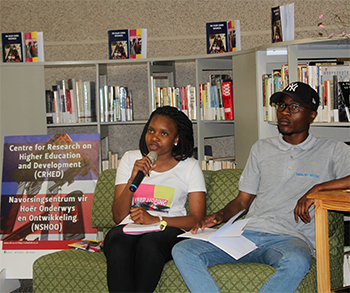Latest News Archive
Please select Category, Year, and then Month to display items
12 January 2024
|
Story Nonsindiswe Qwabe
|
Photo Sonia Small
 Since joining the UFS in 2008, Dr Grey Magaiza has worked extensively on approaches that can foster the socio-economic transformation of societies.
Since joining the UFS in 2008, Dr Grey Magaiza has worked extensively on approaches that can foster the socio-economic transformation of societies.
“The future should be one where communities can decide on their development agenda and futures. That’s the most important for me.” Dr Grey Magaiza, Deputy Director of the Centre for Gender and Africa Studies (CGAS) and Head of the Community Development programme on the Qwaqwa Campus, is passionate about capacitating communities to be agents of change and advancement. His vision for the future emphasises the empowerment of communities to take charge of their development by actively participating in decision making and the implementation of development projects that can improve their lives.
Since joining the UFS in 2008, Dr Magaiza has worked extensively on approaches that can foster the socio-economic transformation of societies. Over the years, he has crafted his research speciality into one that he is most proud of – being an interdisciplinary scientist immersed in the development of communities.
“I’m in a fortunate position of researching what I like. I say ‘fortunate’, because I’ve taken the time to understand what I’m passionate about, which is the overall field of rural livelihoods and livelihood futures – in short, community development. My research starts from an engaged university, understanding the elements that a university must use to enhance transformation and relevance to its immediate community in terms of development.”
One of the ways he has done this is by looking at social entrepreneurship as a development approach for young people in a rural setting. Through workshops with non-profit and civic organisations in Qwaqwa, Dr Magaiza has been helping these organisations to map out their needs and actively meet them through the involvement and support of external role players.
“We understand that communities are part of the national development agenda, but even that national agenda respects community knowledge and intentions and allows communities to shape their identity. A critical enabler of this is community organising. You bring back the capacity in communities to have dialogues on issues affecting them as spaces for engagement, knowledge exchange, and for people to just talk about their way forward.”
By enabling communities to define their development agenda, they can address their specific needs, challenges, and aspirations, he said. “When I look at livelihood futures, it’s quite an exciting aspect of my work – it’s like looking into a fortune tellers’ globe, because you’re not deciding for communities what they should do, but the communities themselves take those decisions.”
Literacy Month fosters the love of reading
2017-09-19

Vutivi Baloyi author of Keep Hoping with Neo Kgoroba
one of the co-authors of In Our Own Words.
Literacy Month is celebrated in September each year at the University of the Free State (UFS) with various activities that are academic and community related and aim to join different departments in collaborative efforts to carry forward an awareness of literacy and the joy of reading among learners. The UFS Sasol Library lined up a series of events to celebrate the month, one of them being the launch of two books on 14 September 2017.
Vutivi Baloyi is a UFS student who wrote a collection of poems at the age of 17 which were recently published in a book called Keep Hoping. The book was launched alongside In Our Own Words, a collection of narratives written by UFS students about university life and transitioning from township high schools to a different culture, society and community, and the challenges with which they are faced.
In their own words, they share incredible experiences
The launch was attended by learners from Christian Liphoko High School in Thaba Nchu as well as Moroka High School and others. The compilation of narratives by UFS students was done under the auspices of Prof Merridy Wilson-Strydom through the Enabling Success project in the Centre for Research in Higher Education. Prof Wilson-Strydom said the project, supported by the National Research Foundation, was a profound way of empowering students by bringing out the value of the stories of their life on campus as they saw them, with each student writing a chapter on a specific theme.
Students as change agents and community builders
The student authors spoke to their audience from the heart, sharing words of advice, especially to younger learners who are still in high school. This has sparked a desire for the beginning of collaborative programmes between the individual university students and high school learners who hail from Botshabelo and Thaba Nchu, highlighting the need for mentorship, life skills, academic improvement and an opportunity to give back.
The event is also part of the ongoing Launch Your Own Book project that has grown in 2017 at the UFS Library under the leadership of Mr Marcus Maphile, Assistant Director: Library Marketing and Community Engagement. Literacy Month will be celebrated with more events in September such as a round-table discussion in collaboration with the Academic and Non-Fiction Authors Association of South Africa (ANSAFA) on 20 September 2017 at the library, to discuss developing authors and the role of ANSAFA. More activities will include outreach and community engagement, with a visit to Christian Liphoko High School in Thaba Nchu on 21 September 2017.